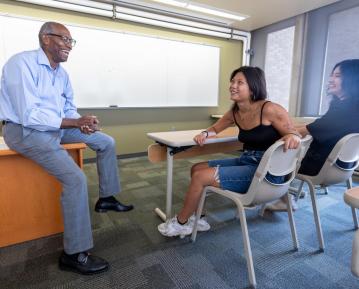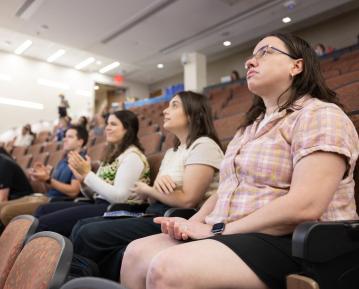By the time I had applied to the University of Pittsburgh Genetic Counseling program, I had been following the field for more than 15 years. I had finally been encouraged to apply when I learned genetic counselors were taking on more leadership roles within clinics and academia, GC-led research was becoming more common, and the field had started to have more critical conversations about the lack of diversity within the workforce and client populations. Our understanding of genetics had soared in the last decade, but populations benefiting from this new knowledge and precision medicine did so within a healthcare system built on the exploitation and exclusion of many groups of people.
While there may not be a sexual orientation or gender “gene,” individuals identifying as being part of the Lesbian, Gay, Bisexual, Transgender, and Queer (LGBTQ+) community participate in healthcare despite egregious examples of prejudice and exclusion. During the 2021 Gallup poll, 7.1% of those surveyed identified as being LGBTQ+, though this is thought to be an underestimate given the continued concerns around safety and discrimination. As a member of the Queer community, I was interested in exploring how gender identity and sexual orientation impact access to genetic information. The LGBT Health certificate allowed an opportunity to learn about past research around health disparities, as well as the evolution of resiliency research, all within the context of evidence-based practice and considerations for program evaluation.
The certificate requires 15 hours of course credit, along with the consideration of LGBTQ+ health within the thesis project. I was initially concerned about the added course work with the already-demanding genetic counseling schedule; however, I found the professors to be accommodating and the coursework to be directly applicable to my professional practice. Because I did not officially begin work on the certificate until my second semester, I graduated in June with the dual degree students. This extra time was needed to complete my thesis work after several semesters of classes on top of the genetic counseling curriculum. In addition to the classes centered on LGBTQ research, many courses within the program allowed for larger consideration of research within healthcare systems. These classes—taught by faculty in Behavioral and Community Health Sciences, Health Policy and Management, and Infectious Disease—provided a unique opportunity to learn more about community-empowered research practices and evaluation of health programs. I was able to learn about the phenomenal research being conducted by other departments within Pitt Public Health and make connections with students outside of our nuclear program.
I use the knowledge gained through this program daily in my practice as a genetic counselor and as a healthcare researcher. While some connections may seem obvious—I co-lead a presentation about sex and gender for second year GC students and co-chair the Justice, Equity, Diversity, and Inclusion committee within the Pennsylvania Association of Genetic Counselors—other applications are more subtle. Because of the discussions and discrepancies around the definition of sexual orientation, I deeply consider how I define and gather demographic information. I challenge students to consider non-traditional family structures and relationships as a clinic supervisor. After learning more about prevention science and implementation, I consider how we can better include communities in studies and then share the outcomes to ensure mutual benefit within the research process. Genetic counseling is based on the tenant of empowering families with the information to make their own healthcare decisions. The LGBT Health certificate expanded the focus to allow me to consider how we are collecting information to improve the access and experience of ALL patients within our healthcare system.
If a whole certificate is not feasible, consider taking a class or two out of the prescribed curriculum—or even asking to audit a class. I have no doubt it will enhance your experience at Pitt by widening your academic and networking circle, but will also expand your understanding of how genetic counselors can contribute to the health justice.




